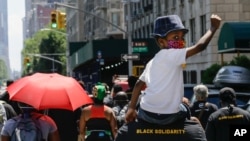African Americans are disproportionately likely to say a family member or close friend has died of COVID-19 or respiratory illness since March, according to a series of surveys conducted since April that lays bare how black Americans have borne the brunt of the pandemic.
Eleven percent of African Americans say they were close with someone who has died from the coronavirus, compared with 5 percent of Americans overall and 4 percent of white Americans.
The findings are based on data from three COVID Impact surveys conducted between April and June by NORC at the University of Chicago for the Data Foundation about the pandemic's effect on the physical, mental and social health of Americans.
While recent surveys conducted by the AP-NORC Center for Public Affairs Research have found that black Americans are especially likely to know someone who had the virus, the new data from the COVID Impact research further details the toll the pandemic has taken on them.
Health inequities
Preexisting conditions and limited access to health care have been identified as reasons black Americans have been particularly susceptible to the virus. Experts and medical professionals say the long-standing effects of structural racism and generational trauma exacted upon black Americans in the centuries following slavery also cannot be ignored.
"The health inequities that we're seeing here are nothing new, because we're starting in a place where during slavery, we had black women who were enslaved and were being experimented on by white male physicians," said New York-based Dr. Uché Blackstock, a former associate professor at the NYU School of Medicine and the founder of Advancing Health Equity. "So our health care system is founded on racism, and our communities have been essentially made sick by racism. We carry the highest disease burden in almost every parameter. We were already in a crisis."
The COVID Impact surveys show the racial gap is equally striking in some cities and states hit especially hard by the virus. In Louisiana, 16 percent of black adults, compared with 6 percent of white adults, were close with someone who died, according to the surveys. Black people represent about 33 percent of the state's population but account for 53 percent of the state's nearly 3,000 COVID-19 deaths, according to data from the state's health department.
The differences are equally stark in several metropolitan areas: Among black adults in Atlanta, 14 percent have a family member or close friend who has died, compared with 4 percent of white adults. The comparison is 12 percent versus 4 percent in Baltimore, 15 percent versus 2 percent in Birmingham, Alabama, and 12 percent versus 4 percent in Chicago.
Twenty-six percent of nonwhite New York City residents say a family member or close friend has died from COVID-19, compared with just 10 percent of white adults.
Stats on black victims
Meanwhile, an Associated Press analysis of data from state and local health departments nationwide found that more than a quarter of all COVID-related deaths nationwide have been black victims — nearly double the share of the black population in the areas sampled. The data, from early June, included nearly 87,000 deaths in which the dead person's race was known in 38 states and Washington, D.C.
In a number of states, the disparity was even more outsized — for instance, in Michigan, black deaths per 100,000 black residents were four times the rate of white deaths per 100,000 white residents.
The nation must also begin to grapple with the psychological trauma of the pandemic, coupled with the economic fallout, the civil unrest in the wake of several high-profile killings of African Americans and witnessing black grief on a mass scale, said University of Michigan health behavior and health education professor Enrique Neblett.
Neblett, who studies the intersection of racism and health, said many African Americans could be dealing with depression, anxiety and other mental struggles.
"It's the confluence of all these factors where it's not just one or two things and that are really weighing hard and heavily on the psyche of black people," Neblett said. "We do know that when you experience loss at unexpected times, there is scientific evidence showing that that's related to worse health outcomes later on in life. I think these impacts may be generational."
The three COVID Impact surveys were conducted between April and June. The national survey uses a sample drawn from NORC's probability-based AmeriSpeak Panel, which is designed to be representative of the U.S. population. State and metropolitan area surveys were conducted using address-based sampling.




